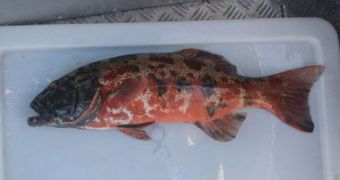The Newcastle University and the Australian Institute of Marine Science recently published a report stating that representatives of a fish species living along the Great Barrier Reef have developed skin cancer.
More precisely, the scientists investigated the general health of the common coral trout population in the region.
Much like in the case of humans, the melanomas present themselves as dark lesions. Apparently, some of the fish suffering from skin cancer had such lesions on just 5% of their body surface, whereas others were almost entirely covered by them.
The researchers explain that, at least for the time being, the melanomas they found in fish are only surface ones. This basically means that, apart from their skin, the animals are fairly healthy.
However, Dr. Michael Sweet from the Newcastle University explains how, “Once the cancer spreads further you would expect the fish to become quite sick, becoming less active and possibly feeding less, hence less likely to be caught.”
He further argues that, “This suggests the actual percentage affected by the cancer is likely to be higher than observed in this study.”
Interestingly enough, the fish found to have skin cancer are presently living in an area which stands directly under a massive hole in the ozone layer.
Therefore, seeing how no signs of pathogens or pollution were found in the marine ecosystems under scrutiny, scientists had no choice but to conclude that these cases of fish skin cancer come as a result of the animals' being exposed to harmful UV light.
New Castle University's Press Office quotes Dr. Michael Sweet, who wishes to point out that, “Further work needs to be carried out to establish the exact cause of the cancer but having eliminated other likely factors such as microbial pathogens and marine pollution, UV radiation appears to be the likely cause.”
Given the fact that the common coral trout is a rather valued fish species, it is expected that these findings will cause concerns amongst locals and environmentalists.

 14 DAY TRIAL //
14 DAY TRIAL //